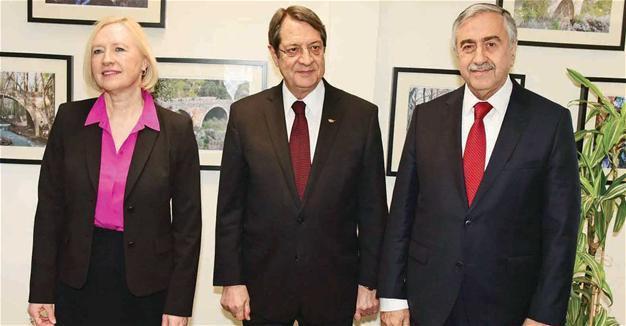Talks show EU does not have mechanism for safety, security, says Turkish Cypriot leader
NICOSIA
 Expert-level talks in Mont Pelerin have showed the European Union cannot provide the kind of safety and constitutional status that Turkish Cypriots want because the bloc does not have such a mechanism, Turkish Cypriot President Mustafa Akıncı has said.
Expert-level talks in Mont Pelerin have showed the European Union cannot provide the kind of safety and constitutional status that Turkish Cypriots want because the bloc does not have such a mechanism, Turkish Cypriot President Mustafa Akıncı has said. “The point that came out in Mont Pelerin is very open and clear. It came out very clearly that the guarantees regarding the safety and [constitutional] status that Turkish Cypriots want cannot be provided by the EU,” Akıncı said in an interview with private broadcaster NTV on Jan. 25.
His remarks came a day before he met Greek Cypriot President Nicos Anastasiades on Jan. 26 at U.N.’s Good Offices in Nicosia under the auspices of the Deputy Special Adviser of the Secretary-General on Cyprus Elizabeth Spehar.
The talks were held on Jan. 18 and 19 in Switzerland’s Mont Pelerin town, which followed one week after a five-party summit in Geneva on Jan. 12, to which the three guarantor states of the island, Turkey, Greece and the United Kingdom, attended alongside Turkish Cypriot and Greek Cypriot administrations.
The thorniest issues in the peace talks are topics on security and guarantee. While Greek Cyprus and Greece want the guarantor system to be scrapped and all Turkish troops on the island to withdraw, Turkish Cypriots, who were subjected to violence by Greek Cypriots before Turkey’s intervention in 1974, and Turkey oppose the idea and say the guarantor system needs to continue, and Turkey would only withdraw its troops if the same amount of soldiers are to be stationed on the two sides of the island.
Akıncı said they wanted an intervention right for Turkey to be allowed in the proposed new system with a mandate decision to be given by the Turkish Cypriot parliament, a right Turkish Cypriots demand due to the violence they experienced in the 1960s.
Akıncı said this right would not only belong to Turkey but also to Greece and the U.K. under the condition that the constitutional statuses of the states are in jeopardy. He said this topic was discussed at Mont Pelerin but resulted ineffective as it was not possible.
He added that Turkish Cypriots did not want to designate guarantees of safety and constitutional status to foreign forces.
He stressed that the new bi-zonal and bi-communal federation should rule that the Turkish Cypriot administration would have its own police force, a change from the 1960 agreement.
“Therefore, we will provide our integral security ourselves. There will also be a federal police force. The number of the armed forces will be equal,” the leader said, adding that all of these issues were topics that have already been agreed on.
[HH] ‘No grounds’ currently for Cyprus solution: Greece
Meanwhile, Greek Prime Minister Alexis Tsipras said on Jan. 25 that he saw “no grounds” at present for a deal to reunify Cyprus after weeks of talks.
“As was evident [in the talks so far] there are no grounds for a solution today,” Tsipras told Efimerida ton Syntakton daily, as reported by AFP.
“But if there does appear to be [room for a solution] I am ready to attend the talks,” he added.
Greek Foreign Minister Nikos Kotzias said the two sides are debating on a proposal for a federal police force composed equally of Greek and Turkish Cypriot officers.
“The Turkish Cypriots will be able to manage their own security, they will have their own police force,” Kotzias told German news agency DPA on the weekend.
“And there will be an international police force that will intervene in case the federal police forces are not sufficient,” he added.
















